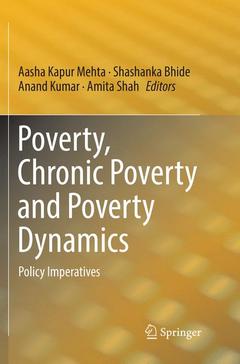Poverty, Chronic Poverty and Poverty Dynamics, Softcover reprint of the original 1st ed. 2018 Policy Imperatives
Langue : Anglais
Coordonnateurs : Mehta Aasha Kapur, Bhide Shashanka, Kumar Anand, Shah Amita

This book discusses critical policy issues that need to be addressed if India wishes to achieve the SDG 1 based elusive goal of ending poverty in the country. In its nine chapters, it takes the readers through trends and estimates of poverty in India, explains changes in the way it has been measured over time and the factors that lead to persistence of poverty, draws attention to the fact that hunger is both a cause and an effect of poverty and has gender and age dimensions too. The book revisits strategies that were successful in addressing poverty emanating from situations of conflict, presents a discussion on migration as a critical coping mechanism among poor, analyses the links between ill health and poverty as well as education and poverty to draw attention to the policy imperatives that need attention.
India?s report card on poverty remains dismal even though there is recognition of the importance of reducing or eliminating or endingit at both national and global levels. Despite rapid economic growth and improvement on a range of development indicators, an unacceptably high proportion of India?s population continues to suffer poverty in multiple dimensions. SDG 1 or ?ending poverty in all its forms everywhere? cannot be achieved unless policies and poverty alleviation programmes understand and address chronic poverty and its dynamics. This requires that we estimate and understand the extent of poverty, the factors that lead to people getting stuck in it and the ways this can be addressed. It also requires understanding the dynamic nature of poverty or the fact that many of those who are poor are able to move out of poverty as well as the fact that many others who are not poor become impoverished. These are the issues that are comprehensively examined and addressed in this book.
In addition to students, teachers and researchers in the areas of development, economic growth, equity and welfare, the book is also of great interest to policy makers, planners and non?government agencies who are concerned with understanding and addressing poverty-related issues in the developing countries.
Introduction.- A review of the Dynamics of poverty.- Hunger, Undernutrition and Food Security in India.- Addressing Poverty and Conflict: A Gandhian initiative.- Changing Scenario of Migration and Poverty in India: Reflections and Issues.- Ill health and Entry into Poverty: What Has Worked, What Has Not and Why.- Education and Poverty.- Eliminating Poverty: Applying the Drivers, Maintainers, Interrupters Framework.
Aasha_Kapur Mehta is Professor of Economics at the Indian Institute of Public Administration. She studied at Delhi School of Economics, Jawaharlal Nehru University (JNU), New Delhi and Iowa State University, USA. She is a McNamara fellow and a Fulbright Scholar. She was a Member of Working Groups for the 11th and 12th Plans; chaired two subgroups; served as a Member of the core group of the Cabinet Secretariat Ad-hoc Task Force for reviewing RFDs of Ministries/Departments of Government of India and State Governments; and Member of Committees constituted by Ministries such as MoRD, MoPR, MoSPI and MWCD. She was invited as an expert to assist Niti Aayog in formulating the Rural Economy chapter for the Vision, Strategy and Action Plan document. She has led the work of the Chronic Poverty Research Centre in India for more than a decade. Her publications are on poverty, human and gender development indicators, multi-dimensional deprivation, gender issues, gender budgeting and data gaps.
Shashanka_Bhide is presently Director of Madras Institute of Development Studies (MIDS), Chennai. He was a senior researcher at the National Council of Applied Economic Research, New Delhi before joining MIDS. He received his PhD from Iowa State University, USA and Masters from Indian Agricultural Research Institute, New Delhi. He has worked in the areas of macroeconomic modelling and forecasting, agricultural economics, infrastructure and issues relating to chronic poverty in rural India.
Anand Kumar is a Fellow at the Indian Institute of Advanced Studies, Shimla since 2016. Prior to this he worked as a Professor of Sociology at the Jawaharlal Nehru University, New Delhi, from 1998. He received an MA in Sociology at the Banaras Hindu University (BHU), Varanasi, 1972; an MPhil in Sociology at the Jawaharlal Nehru University (JNU), New Delhi, 1975; and a PhD in Sociology at the University of Chica
Explores poverty in a dynamic rather than static context, using a drivers, maintainers, and interrupters framework to understand the issue Discusses the importance of strengthening factors enabling exit from poverty, and addressing factors causing its persistence or entry into it Throws light on the critical question of why poverty continues to be the most pressing development challenge facing India
Date de parution : 12-2018
Ouvrage de 254 p.
15.5x23.5 cm
Thème de Poverty, Chronic Poverty and Poverty Dynamics :
© 2024 LAVOISIER S.A.S.



